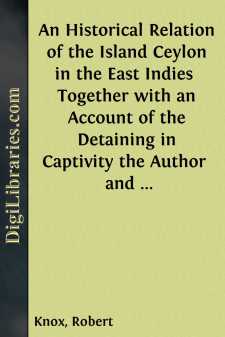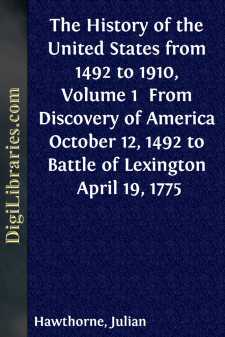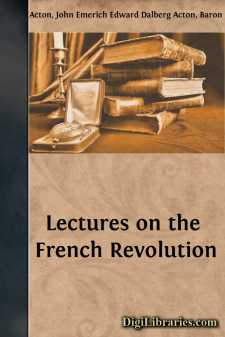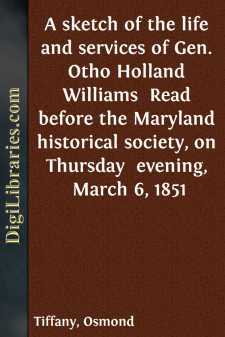History
- Africa 30
- Americas (North Central South West Indies) 50
- Ancient 68
- Asia 58
- Australia & New Zealand 8
- Canada 41
- Caribbean & West Indies 1
- Civilization 20
- Eastern Europe 12
- Europe 310
- Expeditions & Discoveries 60
- General 77
- Historical Geography 1
- Jewish 9
- Latin America 3
- Medieval 8
- Middle East 14
- Military 248
- Revolutionary 8
- Study & Teaching 5
- United States 353
- Western Europe 56
- World 13
History Books
Sort by:
by:
Cassius Dio
Four hundred and seven small pages, over and above the Epistle Dedicatory, are contained in Volume One. Really, however, this is not the true Dio at all, but merely his shadow, seized and distorted to satisfy the ideas of his epitomizer, the monk Xiphilinus, who was separated from him by a thousand years in the flesh and another thousand in the spirit. Of the little specimens here and there translated...
more...
by:
James Madison
Fellow-Citizens of the Senate and House of Representatives: At the period of our last meeting I had the satisfaction of communicating an adjustment with one of the principal belligerent nations, highly important in itself, and still more so as presaging a more extended accommodation. It is with deep concern I am now to inform you that the favorable prospect has been over-clouded by a refusal of the...
more...
by:
Robert Knox
CHAP. I. How this Island lyes with respect unto me Neighbouring Countries, I shall not speak at all, that being to be seen in our ordinary Sea-Cards, which describe those Parts; and but little concerning the Maritime parts of it, now under the Jurisdiction of the Dutch: my design being to relate such things onely that are new and unknown unto these Europæan Nations. It is the Inland Countrey therefore...
more...
WALDEN Economy When I wrote the following pages, or rather the bulk of them, I lived alone, in the woods, a mile from any neighbor, in a house which I had built myself, on the shore of Walden Pond, in Concord, Massachusetts, and earned my living by the labor of my hands only. I lived there two years and two months. At present I am a sojourner in civilized life again. I should not obtrude my affairs so...
more...
by:
Julian Hawthorne
INTRODUCTION When we speak of History, we may mean either one of several things. A savage will make picture-marks on a stone or a bone or a bit of wood; they serve to recall to him and his companions certain events which appeared remarkable or important for one or another reason; there was an earthquake, or a battle, or a famine, or an invasion: the chronicler himself, or some fellow-tribesman of his,...
more...
THE HERALDS OF THE REVOLUTION The revenue of France was near twenty millions when Lewis XVI., finding it inadequate, called upon the nation for supply. In a single lifetime it rose to far more than one hundred millions, while the national income grew still more rapidly; and this increase was wrought by a class to whom the ancient monarchy denied its best rewards, and whom it deprived of power in the...
more...
Ireland, lifting herself from the dust, drying her tears, and proudly demanding her legitimate place among the nations of the earth, is a spectacle to cause immense progress in political philosophy. Behold a nation whose fame had spread over all the earth ere the flag of England had come into existence. For 500 years her life has been apparently extinguished. The fiercest whirlwind of oppression that...
more...
INTRODUCTION When Great Britain declared war upon Germany in August 1914, she staked her very existence as a free nation upon an incalculable adventure. Two new means and modes of warfare, both of recent invention, enormously increased the difficulties of forecast and seemed to make precedents useless. Former wars had been waged on the land and on the sea; the development of submarines and aircraft...
more...
by:
John Taylor
eader, these Travels of mine into Scotland, were not undertaken, neither in imitation, or emulation of any man, but only devised by myself, on purpose to make trial of my friends both in this Kingdom of England, and that of Scotland, and because I would be an eye-witness of divers things which I had heard of that Country; and whereas many shallow-brained Critics, do lay an aspersion on me, that I was...
more...
by:
Osmond Tiffany
Mr. President: The events of the American Revolution are so nearly connected with our own times, that the actors in that great struggle seem yet to be to us as living men. We open the portal of the past century, and are with those who once like ourselves, breathed and thought, and who now, lie not silent or forgotten in the tomb. Their deeds live in our memory; their examples are glorious as of old:...
more...











